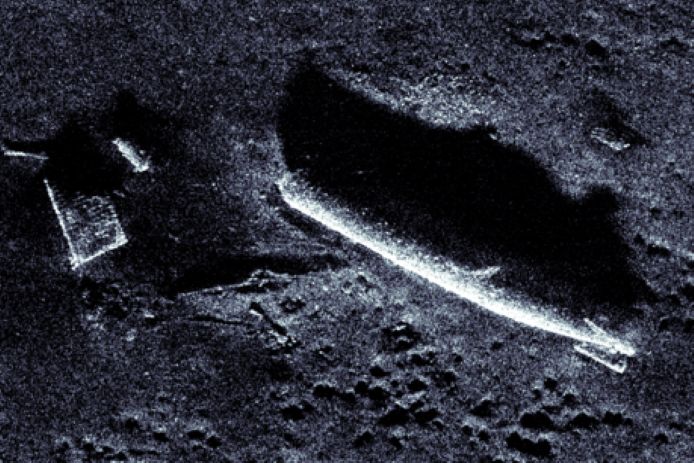Raytheon Missiles & Defense demonstrated the AN/AQS-20C sonar mine-hunting system for the United Kingdom and other potential international customers during an exercise at Narragansett Bay in Rhode Island, Raytheon announced in a press release.
The sonar system sinks into Narragansett Bay in Rhode Island, sweeping the depths with sound waves and swimming back and forth in a grid pattern.
It’s scanning a test range, and it has just found something. Using the echoes from those waves, it draws a picture and sends it to the surface.
What the operators see is clear as day – a photo-quality image of an inert mine.
“That’s amazing. You don’t see that kind of resolution anywhere else,” said Frank Linkous, a senior manager of Undersea Warfare Systems at Raytheon Missiles & Defense, a Raytheon Technologies business.
From a mobile command center, Linkous and others watched as real-time information appeared on monitors that showed the system detect, classify and identify each target: an old shipwreck, some lobster pots, an abandoned torpedo from the 1950s, and inert naval mines.
“The exercise couldn’t have been more successful, and we were pleased to demonstrate our unique capabilities to our invited international guests,” Linkous said.
The AN/AQS-20C system is integrated into the U.S. Navy’s littoral combat ship mine countermeasures mission package. Its advanced signal processing and computer algorithms offer real-time, computer-aided detection and classification against a full spectrum of mines in deep and shallow waters.

The system consists of four sonars that operate together for complete coverage without the need for overlapping searches. Two synthetic aperture sonars provide acoustic identification in all water conditions, while a wideband forward-looking sonar simultaneously hunts mines. A digital gap-filler sonar detects mines directly under the towed body.
Autonomously seek and destroy
By operating from an unmanned platform controlled outside the minefield, the AN/AQS-20C safely and effectively supports expansive mine-clearing operations that previously required a warship manned by more than 80 sailors.
“Hunting for mines is hard. There are a lot of mine-like rocks out there, mine-sized fish and debris,” said Andy Wilby, technical lead for Under Sea Warfare at Raytheon Missiles & Defense.
The system relieves some of the burdens on mine countermeasures operators, whose responsibilities include mission planning and monitoring, data gathering and reporting the results that inform tactical decisions.
“This reduced workload leads to higher clearance rates, with fewer chances of a mistake,” Wilby said.
If the AN/AQS-20C detects a mine, mine counter-measures forces can neutralize it with a Barracuda – a semi-autonomous unmanned underwater vehicle that identifies and destroys mines. Barracuda, developed by Raytheon Missiles & Defense, is expected to be deployed by 2026.
“This is a revolutionary approach,” Linkous said. “Rather than having to detect, classify and neutralize sequentially, with time lags in between, MCM (mine counter-measure) forces will be able to find the mines and neutralize them – all in the same mission.”
Coastal water demonstrations will continue in the United Kingdom for other international navies. Raytheon Missiles & Defense is partnering with Atlas Elektronik UK to integrate the system on the Atlas Remote Combined Influence Minesweeping System, or ARCIMS, unmanned surface vessel.
Check out Naval Library App to find out the specifications of mine hunting sonars.





